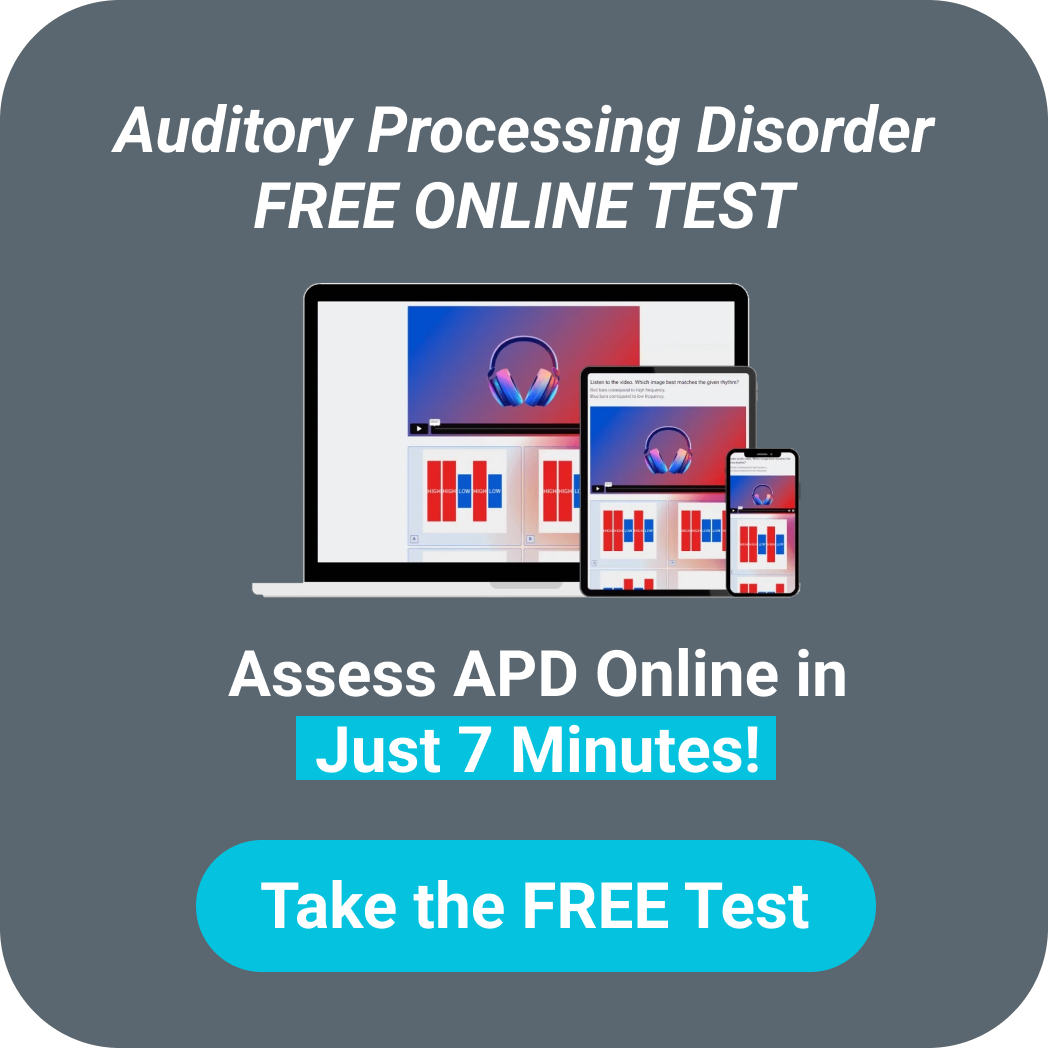Auditory Processing Disorder in Adults | Understanding the Full Scope of Challenges
 Rachel Ann Melegrito
Rachel Ann Melegrito Occupational Therapist
October 17, 2024
Introduction
It’s pretty common for adults to be a bit forgetful or unfocused, from having so much on their plates or just the natural effects of aging. But if you frequently find yourself saying, “What?” or “Could you repeat that?” and struggle to listen or follow conversations, you may have auditory processing disorder (APD). APD, or central auditory processing disorder (CAPD), is when the brain has difficulty processing and interpreting the sounds you hear.
While CAPD often begins in childhood, adults can develop it from growing older as a result of a neurologic disease like stroke or tumor, or a head injury. APD often goes undiagnosed or undetected in adults, especially since they usually pass standard hearing tests [1]. Despite this, it affects 23 to 76% of adults aged 55 and up and goes as high as 95% in those over 80 [2,3].
Through an in-depth look at the challenges faced by adults with APD, we hope to shed light on APD and help you recognize if you or someone close to you might be dealing with this often dismissed condition.
Key Take-Away Messages
| What is Auditory Processing Disorder (APD) in Adults? |
| Auditory Processing Disorder in adults is frequently undiagnosed or overlooked. Adults with APD have problems understanding or interpreting sounds and spoken information, such as conversations, verbal instructions, and music. As a result, they may face challenges with paying attention, experience frequent miscommunications, and encounter social difficulties, including understanding jokes and interpreting the underlying meanings in conversations. |
Symptoms Beyond Communication
Symptoms caused by APD go beyond just listening and understanding what they hear. Because the brain needs more effort to extract the proper meaning of the message from a degraded signal, it uses more working memory to make sense of it. This process can be quite demanding on our cognitive resources, making it more challenging for the brain to perform other tasks simultaneously [4]. This may be the reason why individuals with APD are also typically distracted, have difficulty paying attention, and have associated learning difficulties. These symptoms become more apparent in environments with an increased need for concentration and focus [3].
Cognitive challenges may manifest in different ways in daily life, including:
- going in trouble for not paying attention to what someone else is asking or saying
- forgetting important things
- taking more time to finish tasks
- inability to focus on the task at hand because of competing noises
- taking more time to respond or not responding to others
- trouble following multi-step or complex directions
- problems with multitasking
- difficulty with organization
Impact on Mental Health
Individuals with APD often struggle to accurately hear or interpret what others say, which can lead to misunderstandings. Their difficulty following conversations and understanding underlying meanings in conversations, jokes, and sarcasm cause feelings of anxiety, stress, and embarrassment. Beyond communication difficulties, auditory processing disorder in adults can strain relationships at work, home, and in their personal lives. This ongoing struggle can negatively impact their mental health, potentially leading to feelings of isolation.
A 2019 case study on two adults with CAPD revealed that they find it hard to process information, remember information, and have conversations, which resulted to them having depression, anxiety, feelings of embarrassment, and loss of confidence [5]. Similarly, a 2021 Italian study found a link between late-life depression and age-related CAPD [6].
Challenges in the Workplace
The workplace is where most adults spend most of their time, and having APD can significantly impact seeking and maintaining work. In a 2021 study that looked into the experience of individuals with APD in getting support in different settings, including work, an adult reported that their needs are not recognized at work [7]. Generally, “is auditory processing disorder a disability?” is a question that continues to spark debate in health, government, and workplace settings. One adult in the same study reported that their application for disability benefits was turned down, while another shared that colleagues can be mocking and cruel.
Aside from these, auditory processing disorder in adults can cause a host of work-related challenges:
- trouble clearly understanding what others say in a noisy room or when more than one person is speaking
- difficulty processing rapid speech
- problems conversing over the phone
- difficulty multitasking when an auditory task (e.g., listening) is involved, such as listening to a meeting while recording minutes
- following complex directions
- understanding and remembering spoken information and multi-step directions
- difficulty with spelling, reading, and writing
Such struggles can lead to missed opportunities, such as promotions and upskilling, which are crucial for career advancement.
Strategies for Self-Advocacy
If you or a loved one are experiencing any of the symptoms mentioned above, it’s best to consult with an audiologist for a formal assessment. There is no gold standard auditory processing disorder test. On the other hand, an audiologist diagnoses CAPD based on an individual’s clinical presentation and assessment findings from different batteries and tests [8].
While there is no cure for APD, treatment can help manage symptoms. At the same time, coping strategies like avoiding excessive background noise, lip reading, and requesting work accommodations can make daily life challenges more manageable.
Some work-related accommodations can include the following [9]:
- provision of assistive listening devices
- use of items that help minimize background noise
- work-from-home (WFH) option
- extra time for reports
- reasonable adjustments for training
- necessary equipment and support for meetings and video conferences
- allowed use of recorders and notetakers
- provide materials in written format
- hand out written agendas and minutes in advance
- allow written communication like texts and emails
Treatment Approaches
APD treatment usually depends on its cause but may involve one or more of the following:
- auditory processing disorder therapies, including auditory training done by a speech therapist to remediate auditory processing difficulties
- computer-based training programs
- enhancement of the auditory signal through assistive listening devices
- changes to the listening environments like reducing external noise sources (like loud air conditioner sounds)
- employment of accommodations and strategies, like the use of notetakers, requesting others to speak more slowly and chunk their instructions, and providing supports like written notes
Real Stories of Adults with APD
In a TEDx Talk by Angela Loucks Alexander, who has APD and is the host of Between Two Ears podcast and the founder of the Auditory Processing Institute, she shared that back in grad school, “I had to record my lectures and re-listen to them three times just to understand and remember what I had learned.”
In another Between Two Ears video is a case study of a client named Jackie. As an HR professional, Jackie struggles to follow conversations against background noise, has difficulty hearing during regular meetings, and relies on subtitles to understand dialogue in movies. She also reported having learning difficulties as a child, which doesn’t come as a surprise since auditory processing disorder in ADHD and other learning disorders is common.
In her initial assessment using the Hearing Inventory for Adults (HHIA), Jackie scored 82 out of 100, indicating significant struggles. She reported feeling embarrassed when meeting new people, frustrated in conversations with family members, and had difficulty understanding co-workers, clients, customers, and waitstaff. However, after twelve one-hour sessions with an audiologist, Jackie’s score improved dramatically, dropping to 24 and then to 14.
Conclusion
Having APD can have a huge impact on an adult’s daily life. Aside from affecting work and productivity, it can negatively affect relationships. If you suspect you have APD, it’s never too late to seek help. You can benefit from various therapies, hearing assistive technology, environmental modifications, and coping strategies.You may also want to explore programs that tap into the brain’s ability to reorganize and develop new neural connections. Soundsory® is a multi-sensory, home-based program designed for individuals with APD. It uses a listening device that uses dynamic filters and transmits specially curated music through air and bone conduction to stimulate and retrain the brain to process sounds more effectively.
FAQ
What are the coping skills of someone with auditory processing disorder?
Some coping skills individuals with APD can employ include establishing routines, lip-reading, making lists, and avoiding environments with excessive background noise. Additionally, they can learn to advocate for themselves by requesting that others speak slowly and seeking accommodations to better support their communication needs.
Are there any benefits to treating auditory processing disorder in adults?
Treating APD in adults can dramatically enhance their daily lives by improving communication at work, at home, and in the community. Effective treatment can also boost a person’s confidence and open up opportunities for career advancement, richer social interactions, and greater community involvement.
References
- American Academy of Audiology. (n.d.). Auditory processing disorders. https://www.audiology.org/consumers-and-patients/hearing-and-balance/auditory-processing-disorders/
- Obuchi, C., Ogane, S., Sato, Y., & Kaga, K. (2017). Auditory symptoms and psychological characteristics in adults with auditory processing disorders. Journal of otology, 12(3), 132–137. https://doi.org/10.1016/j.joto.2017.05.001
- Aristidou I & Hohman M. (2023). Central auditory processing disorder. StatPearls [Internet]. Treasure Island (FL): StatPearls Publishing
- Sardone, R., Battista, P., Panza, F., Lozupone, M., Griseta, C., Castellana, F., Capozzo, R., Ruccia, M., Resta, E., Seripa, D., Logroscino, G., & Quaranta, N. (2019). The Age-Related Central Auditory Processing Disorder: silent impairment of the cognitive ear. Frontiers in Neuroscience, 13. https://doi.org/10.3389/fnins.2019.00619
- Heine, C., & Slone, M. (2019). Case studies of adults with central auditory processing disorder: Shifting the spotlight!. SAGE open medical case reports, 7, 2050313X18823461. https://doi.org/10.1177/2050313X18823461
- Lozupone, M., Sardone, R., Donghia, R., D’Urso, F., Piccininni, C., Battista, P., Di Gioia, I., Resta, E., Castellana, F., Lampignano, L., Zupo, R., Bortone, I., Guerra, V., Griseta, C., Seripa, D., Solfrizzi, V., Giannelli, G., Quaranta, N., Logroscino, G., Bellomo, A., … Panza, F. (2021). Late-onset depression is associated to age-related central auditory processing disorder in an older population in Southern Italy. GeroScience, 43(2), 1003–1014. https://doi.org/10.1007/s11357-020-00290-1
- Agrawal, D., Dritsakis, G., Mahon, M., Mountjoy, A., & Bamiou, D. E. (2021). Experiences of Patients With Auditory Processing Disorder in Getting Support in Health, Education, and Work Settings: Findings From an Online Survey. Frontiers in neurology, 12, 607907. https://doi.org/10.3389/fneur.2021.607907
- American Speech Language Association. (n.d.). Central auditory processing disorder. https://www.asha.org/practice-portal/clinical-topics/central-auditory-processing-disorder/
- Mountjoy A. (2022). Making sense of APD at work. https://apdsupportuk.yolasite.com/resources/Making%20sense%20of%20APD%20at%20work-%20FINAL.pdf




